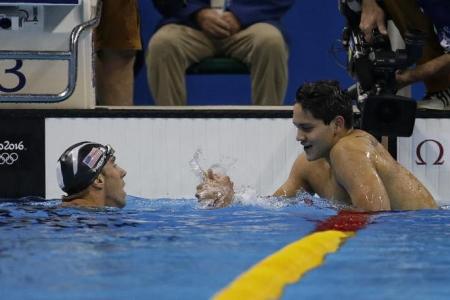Phelps: Schooling’s 2016 gold ‘so impressive’
“Joseph is a stud.”
It’s a warm afternoon at the Omega House in Paris and the mention of Joseph Schooling’s name brings a grin to the face of the greatest swimmer in the world ever.
We forget sometimes how extraordinary Schooling’s gold in the 100m butterfly in Rio 2016 was, but Michael Phelps, who has 23 Olympic gold medals and who got beaten by the Singaporean in that race, knows the size of the accomplishment.
“I knew he was going to be tough in that race in 2016 and he had so much front-half speed. So for me, it’s fun to see him be able to retire when he wanted to, right?”
“He won his gold medal. It’s so big, it’s so impressive, right? To be able to win a gold medal is less than one per cent of one per cent. To have that opportunity like he did, in the moment that he did, it’s a great career. I wish him nothing but the best.”
He said they had communicated in 2023 and that “we went back and forth over text a few times in the last year. And, I love Jojo. He’s been an awesome competitor of mine. I remember meeting him back in 2008 with his parents at the country club pool (in Singapore) and to be able to see what he did.”
If Phelps was grinning as he spoke about Schooling, he was stern when it came to doping. It is a subject which swimming has been unable to avoid after the pre-Olympic controversy involving Chinese swimmers. Phelps did not accuse anyone but pleaded for fairness.
Earlier this year the American had spoken to a US congressional panel on the subject and once again he was firm. “We all need to be held on the same level, period. You guys can see how many times I was tested throughout my career. It’s public record and if everybody is not going through that same testing I have a serious problem. Because it means the level of sport is not fair. It is not even. We’re not playing on an even playing field.
“Throughout my career, I don’t think I ever competed in an even playing field or a clean field. I have some speculations of some athletes that I competed against... but that’s out of my control.”
Taking a hard stance, he said one positive test should mean the end of a career.
“What has to happen is Wada (World Anti-Doping Agency), everybody, has to come together and figure out one way to test everybody all over the world. And if you test positive, you should never be allowed to come back and compete again... Because if you’re taking that risk, then you don’t belong here.”
For Phelps, who has more medals than any other Olympian, this Games is precious. “This is supposed to be where everybody comes together from all over the world and competes in a happy environment. How does that make it fair? How does that make it right? It doesn’t.”
He knows people had suspicions about him, but his response during his career was to ask for more testing of himself. “What about going into (the Olympics in) 2008? I subjected myself to do more testing, blood and urine, weekly.
“Why? For the reason that I could say I’m not cheating and I am clean, and here are the results. I did it the clean way. I won 23 Olympic gold medals. It can be done. Everybody should have that same mental approach to what they do. If not, go be in the cheater games. Isn’t that a thing now?”
Perhaps he was talking about the Enhanced Games, which proposes not to have drug testing. But for Phelps that’s not how he sees sport.
“Keep the Olympics about integrity,” he said.
Get The New Paper on your phone with the free TNP app. Download from the Apple App Store or Google Play Store now


